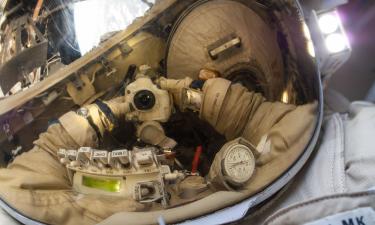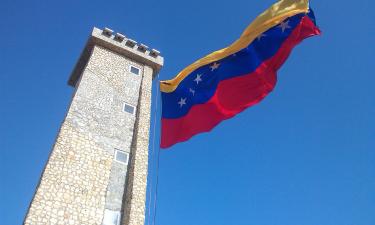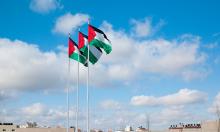Pope Benedict XVI celebrates first Mass
Pope Benedict XVI celebrated his first public Mass as the 265th leader of the Roman Catholic Church on Wednesday after one of the shortest conclaves in a century, which sent an unmistakable signal that the church - buffeted by 21st-century problems - is intent on sticking to tradition.
Benedict, the former Cardinal Joseph Ratzinger of Germany, clutched his pastoral staff and made the sign of the cross as he processed into the intimate Sistine Chapel, led by the cardinals who had elected him pope in the frescoed room a day earlier.
Wearing golden vestments and a gold and white bishop's miter with a cross emblazoned on the front, Ratzinger opened the Mass with a prayer in Latin and was to deliver his first papal homily in Latin - a discourse that will be watched by millions for hints about priorities in his pontificate.
Cardinals also in gold solemnly chanted the Kyrie hymn.
St. Peter's Square was nearly empty early Wednesday, in stark contrast to the hundreds of thousands who thronged the square to see the new pope as he was presented to the world.
The Vatican's hard-line enforcer of church orthodoxy under John Paul II for almost 25 years, Benedict had gone into the two-day conclave in the Sistine Chapel as one of the favorites. He emerged Tuesday as the oldest pontiff in 275 years and the first Germanic pope in almost a millennium.
A wildly cheering crowd of more than 100,000 welcomed Benedict when he stepped onto the balcony of St. Peter's Basilica as dusk fell Tuesday and gave his first blessing as pope, after Chilean Cardinal Jorge Arturo Medina Estevez spoke the Latin words the world had been waiting for, "habemus papam" - "We have a pope" - and announced the papal name Ratzinger had taken.
Pilgrims on St. Peter's Square shouted "Benedetto!" and "Viva il Papa," waved national flags, hugged their neighbors and jumped in joy. Many shed tears of bliss; some wept in disappointment.
In his first words as pope, Benedict paid tribute in accented Italian to "the great John Paul II." He called himself "a simple, humble worker in the vineyard of the Lord."
It was a sign of John Paul's charismatic legacy looming over the new pontiff, who is described by people who know him as intellectual, cultured and rather reserved.
Benedict turned 78 on Saturday, the oldest pope elected since Clement XII in 1730. His age clearly was a factor among cardinals who favored a "transitional" pope who could skillfully lead the church as it absorbs John Paul II's legacy, rather than a younger cardinal who could wind up with another long pontificate.
His election in four ballots over two days - the first of Tuesday's afternoon session - concluded one of the shortest conclaves in 100 years.
A conservative on issues such as homosexuality, the ordination of women, and lifting the celibacy requirement for priests, Benedict has led the Vatican's Congregation for the Doctrine of the Faith - a position he used to discipline church dissidents and uphold church policy against attempts at reform by liberals and activist priests.
Joy over the selection of a new pope immediately mixed with worries that Benedict could polarize a global church, whose challenges include growing secularism in rich countries and inroads by evangelical groups in regions such as Latin America.
"He could be a wedge rather than a unifier for the church," said the Rev. Thomas Reese, editor of the Jesuit weekly magazine America.
Among the crowd on St. Peter's Square, Benedict also brought out sharply differing reactions.
Evelyn Strauch, a 54-year-old housewife from Ratzinger's home state of Bavaria, buried her head in her hands and wept.
"This can't be true," she said. "I had hoped so much that we would get a good pope who would do something for women. ... This is so terrible."
Mark Wunsch, 27, a religious philosophy student from Denver, Colorado, was elated.
"The cardinals elected a good and holy man who was close to Pope John Paul II," he said. "He'll be a wonderful and good leader in preaching the truth and love."
Benedict inherits a range of pressing issues. These include priest sex-abuse scandals that have cost the church millions in settlements in the United States and elsewhere, chronic shortages of priests and nuns in the West, and calls for easing the ban on condoms to help fight the spread of AIDS.
And he has to follow in the footsteps of John Paul II, the global pontiff who made 104 international trips in his more than 26 years as pope and set new standards in reaching out to other religions.
"All of us were talking about the incredible qualities of John Paul II, knowing the world is calling him The Great," said Justin Rigali, the cardinal of Philadelphia, Pennsylvania, who participated in the conclave.
He said the cardinals considered "who could continue the legacy" and "who would be the most effective ... to continue the work and could address the problems present in the world today."
Two images of Ratzinger have emerged in recent days.
With his wispy silver hair blowing in the wind, the German prelate stood before the world's political and spiritual leaders at John Paul's funeral April 8 and offered an eloquent and sensitive farewell that moved some to tears.
Then, just before the cardinals entered the conclave Monday morning, he made clear where he stands ideologically, using words that John Paul would surely have endorsed. He warned about tendencies that he considered dangers to the faith: sects and ideologies like Marxism, liberalism, atheism, agnosticism and relativism - the ideology that there are no absolute truths.
"We are moving toward a dictatorship of relativism which does not recognize anything as for certain and which has as its highest goal one's own ego and one's own desires," the future 265th pope said. The church, he insisted, must defend itself against threats such as "radical individualism" and "vague religious mysticism."
Benedict has denounced rock music, dismissed anyone who had tried to find "feminist" meanings in the Bible, and last year told American bishops it was appropriate to deny Communion to those who support abortion and euthanasia.
Ratzinger is the first Germanic pope in nearly 1,000 years. There were at least three German popes in the 11th century. The last pope from a German-speaking land was Victor II, bishop of Eichstatt, who reigned from 1055-57.
His faith is rooted in Bavaria, the Alpine region with Germany's strongest Catholic identity. Like many of his generation, he carries the burden of Germany's past.
In his memoirs, the policeman's son wrote of being enrolled in Hitler's Nazi youth movement against his will when he was 14 in 1941, when membership was compulsory. He says he was soon let out because of his studies for the priesthood.
In 1943, he was drafted into a Nazi anti-aircraft unit in Munich as a helper, a common fate for teenage boys too young to be soldiers. He later built tank barriers at the Austria-Hungary border. He wrote that he escaped recruitment in the dreaded Nazi SS because he said he was a priest in training.
He deserted in April 1945 and returned home to Traunstein, where he was known for playing Mozart on the seminary's grand piano. After U.S. troops arrived in his town, Ratzinger was identified as a deserter and placed in a prisoner-of-war camp.
He and his older brother, Georg, were ordained in 1951. He taught theology and earned a reputation as a forward-looking prelate. He took part in the 1962-65 Second Vatican Council, a major attempt to modernize the faith, but had some reservations.
Returning to Germany between sessions of the council, "I found the mood in the church and among theologians to be agitated," he wrote in his memoirs. "More and more there was the impression that nothing stood fast in the church, that everything was up for revision."
The Rev. Martin Bialas, who has known Ratzinger for 35 years, said, "First and foremost, he's a theologian. He's an intellectual. By nature, he's someone who prefers to stay in the background."
In 1977, Ratzinger was appointed bishop of Munich and elevated to cardinal three months later by Pope Paul VI. He was one of only two cardinals in the latest conclave who were not chosen by John Paul.
The name he took draws a connection to Benedict XV, the Italian pontiff from 1914 to 1922 who had the difficult task of providing leadership for Catholic countries on opposite sides of World War I. His declared neutrality, and repeated protests against inhuman weapons like poison gas, angered both sides.
Benedict was also known for his outreach to Muslims and efforts to close the nearly 1,000-year estrangement with Christian Orthodox churches - a possible signal that this could be a priority of the new pope.
NICOLE WINFIELD, Associated Press Writer
Subscribe to Pravda.Ru Telegram channel, Facebook, RSS!



